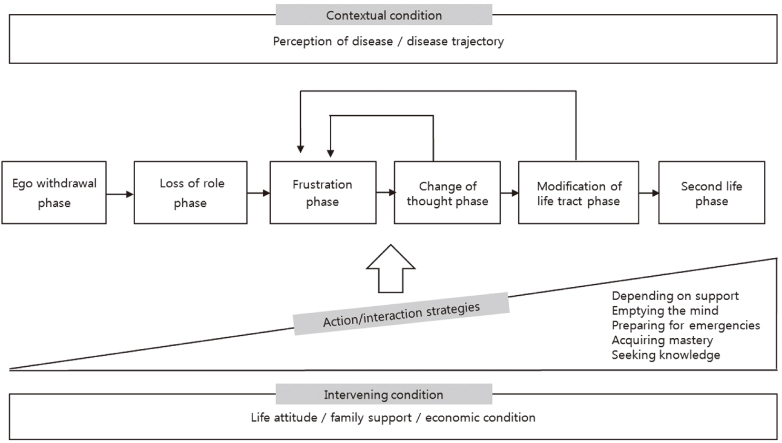J Korean Acad Nurs.
2013 Oct;43(5):636-648. 10.4040/jkan.2013.43.5.636.
Health-Illness Transition of Patients with Young-Onset Parkinson's Disease
- Affiliations
-
- 1College of Nursing, Chonbuk National University, Jeonju, Korea.
- 2College of Nursing, Korea University, Seoul, Korea. scslee@korea.ac.kr
- KMID: 1707165
- DOI: http://doi.org/10.4040/jkan.2013.43.5.636
Abstract
- PURPOSE
The purpose of this study was to explore the health-illness transition of patients with Young-Onset Parkinson's Disease (YOPD).
METHODS
From June to November 2011, 17 patients with YOPD who visited a neurologic clinic in a tertiary hospital participated in the study. Data were collected through in-depth interviews and analyzed using the grounded theory of Strauss and Corbin.
RESULTS
The core category of the participants' health-illness transition emerged as 'reshaping identity following uncontrollable changes'. The participants' health-illness transition process consisted of six phases in sequence: ego withdrawal, loss of role, frustration, change of thought, modification of life tract, and second life. Although most participants proceeded through the six phases chronologically, some returned to the frustration phase and then took up the remaining phases.
CONCLUSION
The study results provide an in-depth understanding of health-illness transition experiences in the participants. These findings suggest a need to develop appropriate nursing intervention strategies according to the different phases in the health-illness transition of patients with YOPD.
Keyword
MeSH Terms
Figure
Reference
-
1. Burgener SC, Berger B. Measuring perceived stigma in persons with progressive neurological disease: Alzheimer's dementia and Parkinson's disease. Dementia. 2008; 7(1):31–53. http://dx.doi.org/10.1177/1471301207085366.2. Calne SM, Kumar A. Young onset Parkinson's disease. Practical management of medical issues. Parkinsonism Relat Disord. 2008; 14(2):133–142. http://dx.doi.org/10.1016/j.parkreldis.2007.07.007.3. Calne SM, Lidstone SC, Kumar A. Psychosocial issues in young-onset Parkinson's disease: Current research and challenges. Parkinsonism Relat Disord. 2008; 14(2):143–150. http://dx.doi.org/10.1016/j.parkreldis.2007.07.012.4. Chick N, Meleis AI. Transitions: A nursing concern. In : Chinn P, editor. Nursing research methodology: Issues and implementation. Rockville, MD: Aspen Publishers;1986. p. 237–257.5. Chung SJ. Genetics in Parkinson' disease. J Korean Med Assoc. 2011; 54(1):70–78. http://dx.doi.org/10.5124/jkma.2011.54.1.70.6. de Lau LM, Breteler MM. Epidemiology of Parkinson's disease. Lancet Neurol. 2006; 5(6):525–535. http://dx.doi.org/10.1016/s1474-4422(06)70471-9.7. Ellis JM. Psychological transition into a residential care facility: Older people's experiences. J Adv Nurs. 2010; 66(5):1159–1168. http://dx.doi.org/10.1111/j.1365-2648.2010.05280.x.8. Fox SH, Katzenschlager R, Lim SY, Ravina B, Seppi K, Coelho M, et al. The movement disorder society evidence-based medicine review update: Treatments for the motor symptoms of Parkinson's disease. Mov Disord. 2011; 26:Suppl 3. S2–S41. http://dx.doi.org/10.1002/mds.23829.9. Fox SH, Lang AE. Levodopa-related motor complicationsphenomenology. Mov Disord. 2008; 23:Suppl 3. S509–S514. http://dx.doi.org/10.1002/mds.22021.10. Guba EG, Lincoln YS. Effective evaluation: Improving the usefulness of evaluation results through responsive and naturalistic approaches. San Francisco, CA: Jossey-Bass;1981.11. Haahr A, Kirkevold M, Hall EO, Østergaard K. Living with advanced Parkinson's disease: A constant struggle with unpredictability. J Adv Nurs. 2011; 67(2):408–417. http://dx.doi.org/10.1111/j.1365-2648.2010.05459.x.12. Kim SR, Chung SJ, Hee SY, Im JH, Lee MC. Factors related to quality of life in patients with Parkinson's disease. J Korean Neurol Assoc. 2005; 23(6):770–775.13. Kostić VS. Treatment of young-onset Parkinson's disease: Role of dopamine receptor agonists. Parkinsonism Relat Disord. 2009; 15:Suppl 4. S71–S75. http://dx.doi.org/10.1016/s1353-8020(09)70839-9.14. Kralik D, Visentin K, van Loon A. Transition: A literature review. J Adv Nurs. 2006; 55(3):320–329. http://dx.doi.org/10.1111/j.1365-2648.2006.03899.x.15. Lee KO, Lyoo CH, Lee MS. Parkin gene mutation in Korean patients with young age onset sporadic Parkinson's disease. J Korean Neurol Assoc. 2006; 24(1):26–30.16. Meleis AI, Sawyer LM, Im EO, Messias DK, Schumacher K. Experiencing transitions: An emerging middle-range theory. ANS Adv Nurs Sci. 2000; 23(1):12–28.17. National Health Insurance Service. 2002-2008 medical treatment trends analysis of geriatric diseases in Korea. 2010. Retrieved February 1, 2010. from http://www.nhic.or.kr/cms/board/board/Board.jsp?act=VIEW&communityKey=B0039&boardId=21956.18. Park YR. Process of seeking positive life of patients with Parkinson' s disease. J Korean Acad Nurs. 2006; 36(5):710–720.19. Periquet M, Latouche M, Lohmann E, Rawal N, De Michele G, Ricard S, et al. Parkin mutations are frequent in patients with isolated early-onset parkinsonism. Brain. 2003; 126(Pt 6):1271–1278.20. Schrag A, Ben-Shlomo Y, Quinn NP. Cross sectional prevalence survey of idiopathic Parkinson's disease and Parkinsonism in London. BMJ. 2000; 321(7252):21–22.21. Schrag A, Hovris A, Morley D, Quinn N, Jahanshahi M. Young-versus older-onset Parkinson's disease: Impact of disease and psychosocial consequences. Mov Disord. 2003; 18(11):1250–1256. http://dx.doi.org/10.1002/mds.10527.22. Schrag A, Schott JM. Epidemiological, clinical, and genetic characteristics of early-onset parkinsonism. Lancet Neurol. 2006; 5(4):355–363. http://dx.doi.org/10.1016/s1474-4422(06)70411-2.23. Stocchi F, Tagliati M, Olanow CW. Treatment of levodopa-induced motor complications. Mov Disord. 2008; 23:Suppl 3. S599–S612. http://dx.doi.org/10.1002/mds.22052.24. Strauss A, Corbin JM. Basics of qualitative research: Techniques and procedures for developing grounded theory. 2nd ed. Thousand Oaks, CA: Sage Publications, Inc;1998.25. Whitney CM. Maintaining the square. How older adults with Parkinson's disease sustain quality in their lives. J Gerontol Nurs. 2004; 30(1):28–35.26. Williams S, Keady J. 'stony road… 19 year journey' ridging' hrough late-stage Parkinson' disease. J Res Nurs. 2008; 13(5):373–388. http://dx.doi.org/10.1177/1744987108095160.
- Full Text Links
- Actions
-
Cited
- CITED
-
- Close
- Share
- Similar articles
-
- Clinical Features of Young-onset Parkinson's Disease
- Seniors with Parkinson's Disease: Initial Medical Treatment
- Illness Experiences of People with Young-onset Dementia
- Heterogeneous Patterns of Striatal Dopamine Loss in Patients with Young- versus Old-Onset Parkinson's Disease: Impact on Clinical Features
- The Clinical Courses of Parkinson's Disease


